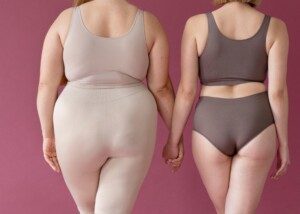“Why are so many direct care providers fat?” This is what a special needs adult asked me one day. There’s 5 reasons.
She herself weighed 250, but her question was fair and reflected an observation of a very true phenomenon that deserves some answers.
You’ll get a variety of explanations depending upon whom you ask.
I’m going to explain five reasons for why it seems as though obesity is overly represented in the line of work known as any of the following:
- Direct care professional/provider
- Direct service professional/provider
- Support community connector
- Mentor
When someone asks me a question like this, my brain automatically goes to a narrative that’s steeped in logic and all the possibilities.
I tend to get a bit analytical rather than adhering to some form of condescending response.
An example of a patronizing answer would be: “Bodies come in all sizes. Just like there’s a diversity of abilities, there’s a diversity of bodies.”
The individual I was working with that day – I’ll call her Ayva – has an intellectual disability.
But a “talk down to” answer such as the above would never get past her.
She’s smart enough to know when she’s being given an answer that insults her intelligence.
I immediately launched into an in-depth and truthful explanation – one that actually addresses the question instead of skirting the crux of the question, which is why it seems that so many direct service providers (DSPs) for special needs adults are morbidly obese.
Drawn to a Profession Working with Marginalized People
For many morbidly obese DSPs, it’s quite possible that they’ve experienced bullying due to their size, shaping their desire to choose a line of work involving individuals who, like themselves, have experienced bullying, social exclusion or some other type of mistreatment.
Someone with significant overweight may feel a kinship with disabled adults, the latter who are often treated as though they have inferior or “less than” status as human beings.
Desire for a Workplace Where They Won’t Stand Out
It’s a fact that obesity and morbid obesity are much more prevalent in the special needs population.
This primarily refers to, first, adults who have an intellectual disability (whether genetic, acquired from brain injury at birth, no known cause, or traumatic brain injury later in childhood).
And second, autism spectrum disorder. Many individuals in day programs are autistic.
These are the two main populations for day programs, and many participants are significantly overweight.
The DSP will visually fit right in. Prior to applying for the job, they may already know of this fact.
They may also know ahead of time that many DSPs tip the scales at a very heavy weight.
The idea of working around many others who share the same degree of overweight can be quite appealing.
A Work Environment Where They Won’t Be Treated Unkindly Due to Their Size
Kind of similar to the preceding reason, a morbidly obese person will feel more at ease in a profession where it’s almost guaranteed that nobody will harass them about their weight or make snide comments such as, “Are you really going to eat all that?”
In fact, what’s popular in the world of community connectors is the mall food court.
These days, any major food court between 11 am and 2 pm is chockfull of special needs groups and their DSPs.
It’s extremely normalized for anyone in these groups – whether the disabled adult or the direct service provider – to eat large amounts of calorie-dense fast-food.
Nobody is going to question your choice of food or the quantity. It just doesn’t happen.
Difficulty Getting More Conventional Jobs
Research shows that bias and stigma against fatness do exist in hiring.
Even in jobs where physical stamina or exceptional mobility aren’t central, some employers may consciously or subconsciously avoid hiring obese candidates.
• Front-facing customer service roles such as receptionist, retail or hospitality where employers might assume that appearance affects customer impression.
• Corporate or executive positions where weight bias may be tied to assumptions about discipline, confidence or leadership ability.
• Sales or marketing jobs where employers may think that body size affects persuasiveness or relatability.
A person with morbid obesity may come to realize that those hiring providers for special needs adults may be far less likely to write off an applicant due to their size.
In this type of work, extreme emphasis is on treating intellectually disabled or autistic individuals with dignity, respect, patience and support.
Not a whole lot of people have the aptitude or passion to work with this population.
There’s also a higher-than-average rate of employee turnover.
So when someone applies for the role of direct service professional, the nonprofit organization that services this population won’t care in the least what you look like.
The morbidly obese applicant sees this as a prime opportunity to be judged 100 percent on their enthusiasm, willingness to be trained and passion for working with special needs individuals.
Sedentary Work
The role of DSP tends to be sedentary. For many obese people, particularly those in middle age, a sedentary job holds much appeal if they’re prone to joint aches, or quick fatigue from physical tasks.
However, some tasks as a DSP can require hard physical output, though it’s not common.
It depends on the population you work with. For example, I know a community connector with significant obesity who, from time to time, must load wheelchairs into her van and then unload them.
The rest of the time she’s driving, slowly walking with her group or seated for long lunches or relaxing under a gazebo in the park.
Logic vs. Research
There’s no hard research that explores why morbid obesity is disproportionately represented in the specific job of direct support professional or community connector.
But using some logic, we can come up with the aforementioned reasons.
Ayva deserved an honest, straightforward response that’s based in reality, rather than embedded in the messages that many TikTok and Instagram influencers pump out to their followers.
Though obesity is very common in the U.S., it does, indeed, appear to be overrepresented in the DSP demographic.
I’ve been a DSP for over two and a half years, which has been plenty of time for me to observe other day programs – and their providers – when out in public.
Prior to my venture into this field of work, I’d frequently see day program groups out and about in the community – with their DSPs.
Finally, Ayva has been in day programs for over 15 years, so she’s had a lot of experience observing providers, not just from the organizations that have served her, but also programs she often runs into while in the community (all major cities have “hotspots” for hangouts; for example, there’s a huge library in my town that attracts many groups from numerous agencies; even more show up at malls and food courts).
Ayva understood my explanations, which were shorter versions of the ones I’ve written for this article.
None of this is fat-shaming. It’s about doing my job: providing a special needs adult with a real-life, truthful answer to a fair question.
 Lorra Garrick has been covering medical and fitness topics for many years, having written thousands of articles for print magazines and websites, including as a ghostwriter. She’s also a former ACE-certified personal trainer. In 2022 she received a diagnosis of Level 1 Autism Spectrum Disorder.
Lorra Garrick has been covering medical and fitness topics for many years, having written thousands of articles for print magazines and websites, including as a ghostwriter. She’s also a former ACE-certified personal trainer. In 2022 she received a diagnosis of Level 1 Autism Spectrum Disorder.
.










































